| |
| |
Photographer,
Location |
Images |
Comments |
|
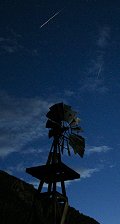
|
Thomas O'Brien,
Independence Pass between Aspen and Twin Lakes Colorado
Sep. 1, 2007 |
#1,
#2,
#3,
movie
|
I was shooting
timelapses of the sky trying to capture the meteor shower
between Twin Lakes and aspen colorado.
Photo
details: Canon
1Ds, 24mm, f/2.8, ISO 1000 6 second exposure captured
at 5:31:44am (2 meteors) 5:29:44am (one small one) and 5:35:52am
(one big meteor).
I
unfortunately had fallen asleep before the clouds cleared
out and never saw one myself. I took about 1300 frames total
and have pulled 3 out so far with meteors.
Click
here to view the time lapse movie.
|
|

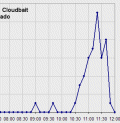
|
Chris Peterson,
Guffey, Colorado, USA
Sep. 1, 2007 |
#1,
more |
This is a composite
image of 49 Aurigid meteors collected with a video all-sky
camera. Nearly all the meteors occurred during a sharp peak
around the predicted time of UT 11:30. |
|
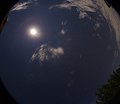
|
Chris Schur,
Payson, Arizona
Sep. 1, 2007 |
#1,
#2, more |
First tests
with our new Sigma
8mm fisheye wide open showed pinpoint stars and we even
got several meteors. The rate here in Payson was about 24/hr
zenithal rate.
Photo
details: Canon
XTi, 8mm f/3.5, ISO800, 30sec |
|
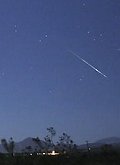
|
Dennis Mammana,
Borrego Springs, California, USA
Sep. 1, 2007 |
#1,
more |
With moonlight
washing out much of the desert sky, I was able to see only
a few Aurigids during the morning hours.
Photo
details: Canon
20D, 14mm f/2.8L lens at f/2.8, 1600 ISO, 5s exposure.
|
|
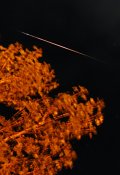
|
Colleen Gino,
Polvadera, NM
Sep. 1, 2007 |
#1,
more |
I went out to my front yard from 4:50 to 5:50 AM MDT. I didn't have high expectations, so I was pleasantly surprised. I saw about 16 meteors, 3 of them fairly bright, and one of those three I was lucky enough to catch in an image (attached). I may have caught a couple faint ones as well, will have to check carefully for those and for the two satellites I should have imaged.
|
|
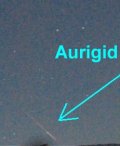
|
Parks Squyres,
SaddleBrooke, Arizona ( 20 miles north of Tucson)
Sep. 1, 2007 |
#1,
more |
I saw many
bright ones but never had the camera pointed in the right
direction. I got up at 4:00 AM and looked out the window
and they were falling at the rate of several a minute. I
set up my camera about 4:15 but they had already slowed
down to less than one a minute.
Photo
details: Nikon
D80 Camera ASA 3200 15 second exposure |
|

|
Richard McCoy,
Mead, Colorado, USA
Sep. 1, 2007 |
#1,
#2 |
I observed for
45 minutes and saw 20 meteors. Around 5:20 MDT I saw a burst
of three meteors.
Photo
details: Nikon
D70s, 1600 ASA, 10s exposure. |
|
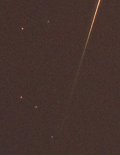
|
Chris Kitting,
Hayward, California
Sep. 1, 2007 |
#1 |
This is a quick
report on the Aurigids from astronomy instructor Richard
Nolthenius. Several members of the Cabrillo College Astronomy
Club watched from the Santa Cruz Mountains. I did 10 minute
counts from 10:40UT to 12:10 UT. Rates started around 10/hr
and rose to almost 100/hr at 11:15UT, dropped slightly to
11:35UT, and then dropped sharply back down to 10/hr after
11:40UT. Up to the peak, the meteors were almost all bright;
magnitude 1 and brighter. After the peak, they were dimmer
and sparse, almost like someone just shut off the meteor
spigot! A couple of members got photos, which I hope to
post on our website later. Chris Kitting has just sent me
the first image, which I include here. |
|
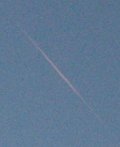
|
DAVID HUGG SR,
Lake Wright Patman, Texas USA - south of Texarkana
Sep. 1, 2007 |
#1 |
One of the last pix I took before it got too light. Saw only 2 meteors total.
|
|
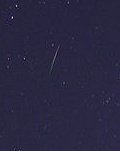
|
Evan Fain,
Rancho Cordova, CA
Sep. 1, 2007 |
#1 |
They said these things were going to be fast movers - WOW!
watched from 3:50 to 5:10 PDT and saw about 20
this shot:
Exposure time [s] : 30.00
F-Number: 2.0
ISO speed ratings: 100
Date taken: 2007:09:01 04:03:05
|
REPORTS:
from
Paul Robinson of Boulder, Colorado: "This morning
(Sept. 1, 2007) I saw a nice display of Aurigid meteors from just
east of Boulder, CO. I watched from 4:45 am MDT til 5:45 am MDT.
The first meteor I saw was at 4:55. The rate climed unsteadily
to a sharp peak at 5:20-21 during which I saw 3 or 4 meteors/minute.
Then rates fell sharply. The meteors were fast and brief lasting
about 1/2 second with brief trains. Most were magnitude 2 to 0,
though one was -2. It was alot of fun considering the mystery
of whether there would even be a shower and how good it got to
be!"
from
Michael Funk of Astoria, Oregon: "I estimate about
20 meteors per hour is what I observed last nite from 4;00-5:00
am. One particularly bright one seemed to skip on the atmosphere
as it flashed bright a couple times."
from
M. L. (Chip) Gentry of the University of Texas at Austin:
"I spotted four Aurigids between 6:25am and 6:44am CDT. The
brightest was about Venus brightness, dimmest was slightly dimmer
than Rigel. Two came with seconds of each other, around 6:34am.
Movement was very fast. I had maybe a 40 x 40 degree patch of
sky in the Orion direction to work with due to cloud cover."
from
Janice of Boise, ID: "I watched here in Boise, ID
from 5-6 AM. Saw 3 slightly green, and two yellow-orange. There
was one white one almost due north that left a trail that was
visible for many seconds. I was not disappointed. Total count
20-25, some were just small dots that did not leave a trail."
from
Tom Klimek of Lemon Grove, California: "From 0415
to 0435 Pacific time, I saw eight meteors. Two were especially
long and bright, about the same magnitude as Sirius. One left
a five second trail across Orion!"
|
|